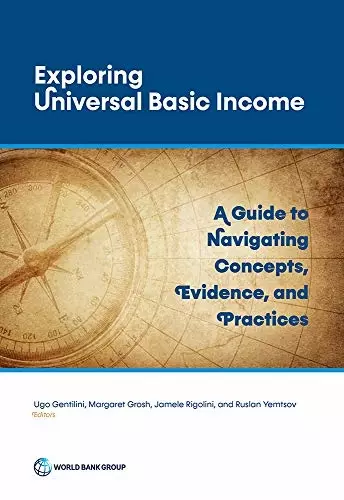Exploring Universal Basic Income
Ugo Gentilini, Margaret Grosh, Jamele Rigolini, and Ruslan Yemtsov
"Exploring Universal Basic Income - A Guide to Navigating Concepts, Evidence, and Practices", Ugo Gentilini, Margaret Grosh, Jamele Rigolini, and Ruslan Yemtsov
This World Bank Group report offers a comprehensive coverage of basic income proposals across a wide range of developing countries. The authors define UBI to be universal, unconditional, and paid in cash (although this may include digital cash?), meaning that the only true pilots of UBI to date have been in Mongolia and Iran. Their overall finding is that budget-neutral UBI schemes are less effective at reducing poverty than existing schemes (p147), which are 60% more effective than UBI, and that raising UBI to be equally effective at poverty alleviation would require politically unacceptable tax increases (of up to 68.4% in India).
The report includes a very useful table comparing various forms of social welfare, including job guarantees, public works, wage subsidies, cash transfers (targeted, conditional, or categorical), negative income tax, and UBI (Table 2.2 pages 90-91). UBI may achieve greater coverage where there has been a shift to non-standard work (p52). UBI has less disincentive to work than Guaranteed Minimum Income schemes with steep withdrawal tapers (p77), whilst the gentler tapering of Negative Income Tax makes it analytically equivalent to UBI (p80).
Chapter 3 on work only considers the impact of UBI on work in terms of labour market participation, labour bargaining power, quality of work etc, and not how changes in work may require UBI. Analysis of 165 countries over 15 years, and specific reports from Alaska, Iran, and Finland demonstrate very limited effects on labour participation rates. Chapter 4 reports on a wide range of microsimulations of UBI proposals.
Chapter 5 addresses the issue of financing UBI and, in the light of current 50% debt/GDP ratios facing many developing countries, concludes that ‘the scope to increase debt levels without significant risks for fiscal sustainability is likely to be severely constrained in the majority of countries’ (p180). UBI competes with subsidies, with post-tax subsidies reaching 6.5% of GDP, and pre-tax subsidies in some countries exceeding 10% of GDP. Only in the Russian economy is UBI superior in poverty alleviation than subsidies. Equally, only in Russia is personal income tax a progressive funder of UBI. The report dismisses corporation tax and property tax as sources of UBI funding, but favours eco-taxes, which, if their distributional effects can be eliminated, have ‘much to recommend them’ (p174). This despite the ethical consideration that we should be seeking to eliminate emissions, not use them as a source of revenue for UBI.
The final chapters consider the political and practical issues facing adoption and implementation of UBI.
The main weakness of this extensive report is that it fails to consider the production side of the economy, or more radical options of money financing of UBI. The economic focus of the report is on income rather than on consumption, and not at all on production. Ultimately it is production which will fund income-enabled consumption. We therefore need to consider whether developing country economies, and/or the global economy can produce to provide the consumption enabled by UBI. We also need to ask whether a 50% debt/GDP ratio should be allowed to restrict developing country economies, when developed economies regularly accumulate national debts in excess of 100% of GDP, and in Japan’s case in excess of 200% of GDP.
The report only casually mentions the role of technology and automation in threatening employment. But automation in the production sector reduces the wage component of output, requiring some form of non-wage income, eg UBI, to fill the gap. We should also consider whether debt-free sovereign money is a sustainable solution to replace national debts currently constraining developed economies and crippling developing economies. More on this in ‘The Case for Basic Income’ at www.ubi.org and my book ‘Basic Income and Sovereign Money’.
The book is available here.
Geoff Crocker
Editor ‘The Case for Universal Basic Income'
www.ubi.org

